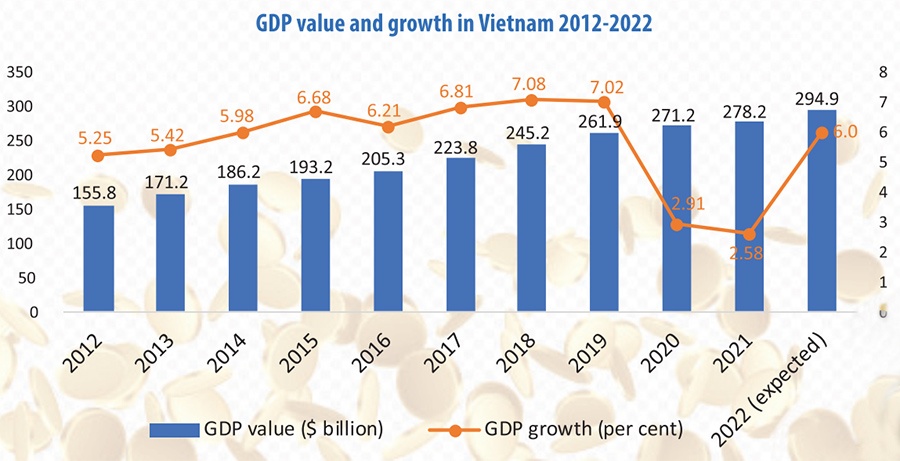A new vision for nation’s resurgence
 |
| Minister of Planning and Investment Nguyen Chi Dung |
When the pandemic hit the country seriously in 2021, social distancing rules were applied in numerous big cities and provinces, many businesses went into bankruptcy, and global supply chains broke. Nevertheless, Vietnam still reached and surpassed some economic indicators. GDP went up 2.58 per cent; the total export value reached $668.5 billion, up 22.6 per cent on-year, landing Vietnam in the top 20 economies in terms of international trade; the trade surplus was $4 billion; and the registered foreign investment into the country hit $31.15 billion, an increase of 9.2 per cent on-year.
These results come from the determination of all levels from the National Assembly (NA), government, ministries, agencies, localities, all economic sectors, businesses, and the people to carry out important policies to both fight against the coronavirus and develop the economy.
The building, promulgating, and perfecting institutional policies have been paid the most attention in order to be implemented promptly and synchronously to meet the requirements of the people and businesses in recent years. Hundreds of resolutions, decrees, decisions, and circulars have been issued to promptly remove difficulties for businesses and unleash the internal resources of the economy.
The most important policy for strong decentralisation and paving the way for the government to promptly issue and deploy solutions to remove difficulties for people and businesses was Resolution No.30/2021/QH15 dated July 2021, assigning the government and the prime minister to decide and organise the implementation of measures that have not yet regulated or been different from the regulations in the current legal framework to meet urgent requirements of pandemic prevention and control.
 |
Strong efforts
The government has also adopted numerous important policies to remove difficulties for the people and businesses like Resolution No.86/NQ-CP, Resolution No.105/NQ-CP, and Resolution No.128/NQ-CP, which are solutions to facilitate ministries, agencies, localities to prevent COVID-19, ensure social welfare, and support the people and businesses. They are highly appreciated by the local and foreign business communities for removing woes, restoring the broken supply chains, and overcoming burdens on cash flows, costs, labour, and experts.
Of these, the Ministry of Planning and Investment (MPI) proposed to perfect a transparent and favourable investment and business climate, which is going to be similar to international practices. We listen to the comments and recommendations of businesses to be a bridge between them and relevant government agencies, as well as provide general advice to the government and prime minister.
In order to build a facilitating government last year, the MPI proposed to issue important laws with new mindsets and visions. For example, a law amending nine other laws, which was officially adopted by the NA in January to strengthen decentralisation of all level agencies, promoted the proactive rights to mobilise and effectively use social resources for development investment.
The MPI has advised the government to submit to the NA for approval a socioeconomic development plan towards 2025, medium-term public investment, economic restructuring, and master plans for all sectors and localities.
Additionally, being on the standing authority of two prime minister’s special working groups, we have received and dealt with the comments and recommendations of 25 associations related to burdens hit by the pandemic, 70 issues of public investment projects, 200 issues in business projects, and 37 concerns about public-private partnership projects. The MPI established working groups to check and push the disbursement of public investments. Therefore, the disbursement of public investment projects in 2021 was estimated at 80 per cent.
The MPI submitted to the government the programme on sustainable economic recovery and development in association with improving the internal capacity and self-reliance of the economy in the 2022-2023 period, which is being evaluated by the NA to provide solutions to recover and promote production and business, economic restructuring, and innovation.
I believe that in every country, the consensus and agreement of the people and businesses in the government’s decisions play an important role in the success or failure of those policies. During the long history of the country, solidarity is always a sharp weapon for victory, despite difficult circumstances, and that is also the key for us to overcome the woes hit by the pandemic in the past two years.
The business community and entrepreneurs have raised the spirit of sharing and accompanying the country to overcome burdens, improve their self-reliance, adapt to circumstances to maintain production and jobs for their employees. Businesses have quickly resumed production, as well as applied digital solutions and technologies to expand their markets – especially focusing on the domestic market, and quickly grasping new business opportunities.
Another good thing is that businesses have many activities to support the people and communities like great financial contributions to the COVID-19 vaccine fund, delivering medical supplies and equipment to localities, and numerous initiatives like rice ATMs, free meals, and zero-VND supermarkets.
Solutions for recovery
In 2022, Vietnam is still an attractive destination for investments in the medium term. In order to seize the opportunities for economic recovery, we should carry out numerous solutions. Firstly, coverage of vaccinations should be increased quickly for all people of suitable age, especially for the labour force in all enterprises and business households, so that they can resume production and business.
Secondly, a harmonious combination between fiscal and monetary policies is necessary, focusing on supporting businesses and individual business households to overcome burdens. Of these, monetary policies will be implemented at a suitable manner.
Next, disbursement speed-up and effective use of investments should be improved, especially in key industries as well as large and inter-regional connectivity projects. In particular, the efficiency of using public investment capital should be enhanced to spill over to private and foreign-invested businesses; promoting the strengths of free trade agreements (FTAs) in order to improve the efficiency of international trade activities and boost export activities; and enhancing and utilising more overseas inflows.
Following that, economic restructuring should be carried out quickly to promote comparative advantages and participate in global value chains; promote internal resources, and the development of products with high competitiveness and added value.
In addition, we should proactively prepare sufficient conditions to promote production and business, ensure supply and circulation of goods, and reduce inflation risks. For short-term shortage of goods, it is necessary to have policies and solutions to cut production costs and import raw materials in a timely manner; strengthen inspection and resolute handling when detecting acts of speculation and manipulating prices; implement solutions to connect and ensure an appropriate supply of labour; and create connections in the labour supply chain among localities.
Furthermore, the implementation of digital transformation in institutional reform and administrative procedures is important. At present, traditional administrative procedures and the application of technology do not meet the requirements and demands of the people and businesses in the new context. Procedural barriers not only cause difficulties but also create unfairness for the business community in accessing policies and distort the business environment. In addition, there should be cooperation between state agencies, ministries, and localities to improve a decentralisation mechanism to create the most convenience.
The final factor is creating a policy connecting supply chains of goods and services with the consensus at local authorities, solving inconsistency. In order to restore supply chains and export activities, it is necessary to maximise the circulation of goods and workers to serve the recovery of production after the pandemic and ensure an adequate supply of materials and energy, as well as utilise as much as possible the advantages of Vietnam in all FTAs to boost export value.
What the stars mean:
★ Poor ★ ★ Promising ★★★ Good ★★★★ Very good ★★★★★ Exceptional
Related Contents
Latest News
More News
- Kurz Vietnam expands Gia Lai factory (February 27, 2026 | 16:37)
- SK Innovation-led consortium wins $2.3 billion LNG project in Nghe An (February 25, 2026 | 07:56)
- THACO opens $70 million manufacturing complex in Danang (February 25, 2026 | 07:54)
- Phu Quoc International Airport expansion approved to meet rising demand (February 24, 2026 | 10:00)
- Bac Giang International Logistics Centre faces land clearance barrier (February 24, 2026 | 08:00)
- Bright prospects abound in European investment (February 19, 2026 | 20:27)
- Internal strengths attest to commitment to progress (February 19, 2026 | 20:13)
- Vietnam, New Zealand seek level-up in ties (February 19, 2026 | 18:06)
- Untapped potential in relations with Indonesia (February 19, 2026 | 17:56)
- German strengths match Vietnamese aspirations (February 19, 2026 | 17:40)

 Tag:
Tag:


















 Mobile Version
Mobile Version